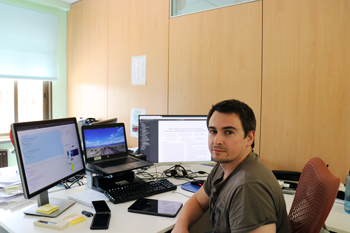IMDEA Networks

Nuberu: A Reliable DU Design Suitable for Virtualization Platforms

Andres Garcia-Saavedra, Principal Researcher en NEC Laboratories Europe
External Presentation (External Speaker)
RAN virtualization will become a key technology for the last mile of next-generation mobile networks driven by initiatives such as the O-RAN alliance. However, due to the computing fluctuations inherent to wireless dynamics and resource contention in shared computing infrastructure, the price to migrate from dedicated to shared platforms may be too high. Indeed, we show that the baseline architecture of a base station’s distributed unit (DU) collapses upon moments of deficit in computing capacity. Recent solutions to accelerate some signal processing tasks certainly help but do not tackle the core problem: a DU pipeline that requires predictable computing to provide carrier-grade reliability.
We present Nuberu, a novel pipeline architecture for 4G/5G DUs specifically engineered for non-deterministic computing platforms. Our design has one key objective to attain reliability: to guarantee a minimum set of signals that preserve synchronization between the DU and its users during computing capacity shortages and, provided this, maximize network throughput. To this end, we use techniques such as tight deadline control, jitter-absorbing buffers, predictive HARQ, and congestion control. Using an experimental prototype, we show that Nuberu attains >95% of the theoretical spectrum efficiency in hostile environments, where state-of-art approaches lose connectivity, and at least 80% resource savings.
About Andres Garcia-Saavedra
Andres Garcia-Saavedra received his PhD degree from the University Carlos III of Madrid (UC3M) in 2013. He then joined Trinity College Dublin (TCD), Ireland, as a research fellow until 2015. Currently, he is a Principal Researcher at NEC Laboratories Europe.
Este evento se impartirá en inglés

